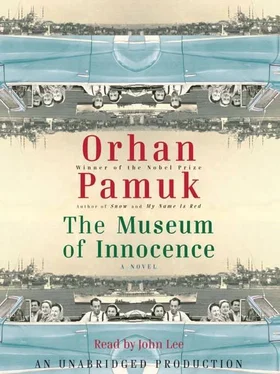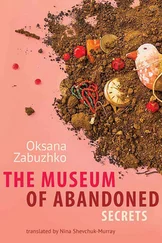The new pain, the pain of presence, was in fact the pain of humiliation. It seemed that Füsun did take care to spare me pain of that kind, shying away from subjects and situations that might wound my pride. But in the face of those crude last words of hers, I finally realized that to pretend nothing was amiss was no longer possible.
I had tried at first pretending not to hear them reverberating in my mind: “shell out the money… We’re sick and tired of waiting.” But my feeble mumbled rejoinder (“Is that so?”) was proof that I had heard her. I could not, therefore, act as if no offense had been taken; and, anyway, who could have missed my grim expression, which spoke of spirits plummeting and utter humiliation. Her insult ringing in my head, I went back to my chair and sat down, still clutching my soda bottle. It was hard for me to move. The worst part was not even those cutting words, but Füsun’s evident awareness of my humiliation and the upset it caused me.
I forced myself to think of something else, ordinary matters. I remember asking the same question I would ask myself in my youth whenever I thought I would explode from boredom, surrendering to metaphysical musing, as in: “What am I thinking now? Am I thinking that I’m thinking?” After repeating this sentence silently many times over, I turned to Füsun in a decisive way and said, “They want us to return the empties,” and, taking the empty bottle from her hand, I stood up and walked away. In my other hand was my own bottle. There was still some soda in it. No one was looking, so I poured my soda into Füsun’s bottle, handing mine, now empty, back to the boys selling the sodas. So I was able to return to my seat with Füsun’s bottle, which I display here.
Füsun was talking to her husband; they didn’t notice me. I cannot recall a single thing about the film we watched next. This is because the bottle that had touched Füsun’s lips only a few moments earlier was now in my trembling hands. I had no interest in anything else. I wanted to return to my own world, to my own things. This bottle would remain for many years on the bedside table at the Merhamet Apartments, meticulously preserved. Visitors will recognize it by its shape as a bottle of Meltem soda, the soda launched at the time our story begins, and now available throughout the country, but the soda inside was not Zaim’s highly praised recipe. For already very poor imitations of our first great national soda brand were turning up everywhere. There were little local pirate soda plants operating underground that would collect empty Meltem bottles, fill them with the cheap counterfeit, and distribute them to unsuspecting or indifferent vendors. When he noticed me with the bottle against my lips as we drove back in the car, Feridun, quite unaware of my conversation with his wife, said, “This Meltem soda is great stuff, isn’t it, brother?” I told him that the soda wasn’t “genuine” Meltem, from which he deduced the scheme and felt compelled to comment: “In the backstreets of Bakırköy there’s a secret propane-filling depot. They fill Aygaz canisters with cheap cooking gas. We bought it, too, once. Brother Kemal, please believe me when I tell you-the fake burned better than the real thing.”
I brushed the bottle against my lips with care. “This one tastes better, too,” I said.
As the car rumbled over the silent backstreets, passing through pools of pale lamplight and shuddering gently over the cobblestones, the shadows of trees and leaves flickered on the windshield as they do in dreams. Sitting in the front next to Çetin the chauffeur as always, I could feel my heart swelling painfully, so I did not turn around to look at them, even when the usual talk about the films began. Çetin Efendi was not inclined to join these conversations we had on the way home, and it was perhaps because the silence was making even him uncomfortable that he ventured to observe how certain parts of the film were not credible. An Istanbul chauffeur would never scold the young lady he worked for, not even politely, as in the film, he insisted.
“But he’s not really a chauffeur,” said Feridun the son-in-law. “He’s the famous actor Ayhan Işık.”
“You’re right, sir,” said Çetin. “And that’s why I liked it. In a way, it was educational… As entertaining as the films we’ve seen this summer have been, I love them more for offering lessons about life.”
Füsun was silent, as was I. When I heard Çetin Efendi say “this summer,” my pain grew sharper. For his words reminded me that these lovely summer nights were drawing to a close: No longer would we be coming to these cinema gardens to see films; the joy I’d known sitting beside Füsun under the stars would soon be a memory, and I was ready to talk about anything that might have popped into my head, just to hide my distress from her, but my lips remained pressed so tightly shut one couldn’t have pried them open with a knife. I was sinking into a bitterness that would, I suspected, last a very long time.
I didn’t want to see Füsun at all, or indeed anyone who would have befriended me just to help her husband make a film-in other words, just for money. It was a bald fact and in a way thrilling that she would not even bother to conceal her venal purpose, thrilling because I knew I could never be attracted to such a person, and in this recognition I could glimpse an easy break.
That night, when I dropped them off in the car, contrary to custom, I appointed no date for the next trip to a cinema. For three days I did not get in touch. It was during this period that I began to exhibit (first in the recesses of my mind, but gradually in a more pronounced way) a new manner of brooding. I thought of it as “diplomatic pique,” for it derived less from the pain of heartbreak than from a sense of protocol: Abuse of friendship must be answered accordingly so as to decry such behavior and preserve our pride. Obviously the retribution I had in mind for Füsun was a refusal to back her husband’s film, and with it the death of her dreams of becoming a movie star. “Let’s see what happens,” I told myself, “if this film doesn’t get made!” Having come to feel my previously formal pique viscerally I began, on the second day, to imagine in some detail the ways in which Füsun might be suffering in reaction to her punishment. Unfortunately in my imagination it was the dimming of her as yet unrisen star that upset Füsun and not the prospect of no longer seeing me. Perhaps this was not an illusion, but the truth.
The pleasure of imagining Füsun remorseful had, by the second day, overwhelmed my visceral pique. By the evening of that day, as I sat eating silently with my mother in Suadiye, I realized I had begun to miss Füsun. My viscera having healed, I knew that I could only maintain my pique for the sake of punishing her. As I ate my supper I tried to put myself in Füsun’s place and adopt a cruel pragmatism. I imagined the agony and remorse I’d be feeling if I were a beautiful young woman, on the verge of starring in a film directed by my husband, when with a thoughtless remark I had shattered the feelings of the wealthy producer, and with them, the hope of becoming a star. But for my mother’s continued interruptions (“Why didn’t you finish your meat? Are you going out this evening? Summer’s almost over. We don’t have to wait until the end of the month-we can go back to Nişantaşı tomorrow. How many glasses does that make for you tonight?”) I might have succeeded in putting myself in Füsun’s place.
In the course of my drunken struggle to guess what Füsun might be thinking, the possibility occurred to me that from the moment I’d heard the ugly words (“So you’re saying that you really are going to shell out the money…”) provoking my “diplomatic pique,” a vengefulness in me had been exposed. I wanted to take revenge on Füsun, but because it both frightened and shamed me to entertain such a wish, I instead convinced myself that I “never wanted to see her again.” This was the more honorable way, as it would allow me to take my revenge with a clear conscience, whereas exaggerating my visceral pique could only serve to excuse the sin by cloaking my desire to punish her in a victim’s innocence. Realizing this, I decided to forgive Füsun and go to see her, and having so decided, I began to see everything in a more positive light. Still, before I could go see them again, I would have to engage in more thinking, as well as self-deception.
Читать дальше












